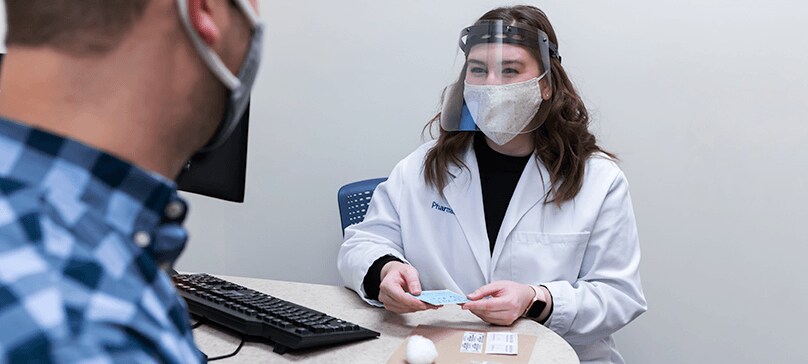Pre-Existing Conditions & COVID-19
By Kroger Health Experts
Last Updated January 29, 2021
Living with a long-term health condition can impact your life in many ways and put you at greater risk for severe COVID-19 illness. According to the Centers for Disease Control and Prevention (CDC), 73% of patients hospitalized with COVID-19 had a pre-existing condition. The CDC also estimates 60% of adults in the U.S. have a chronic disease that can weaken the immune system, making it less effective in fighting the virus.
Which underlying conditions put patients at a higher risk? We’ve gathered what you need to know about which conditions may make it more difficult to fight COVID-19.
Common Health Conditions & COVID-19 Outcomes
High Blood Pressure
Also known as hypertension, high blood pressure is very prevalent in the United States, affecting about 45% of Americans. Patients with high blood pressure may have an increased risk of serious COVID-19 symptoms. As the virus continues to spread, researchers are trying to discover why so many COVID-19 patients with hypertension continue to be at risk for severe disease from this virus. One theory is the organ damage caused by hypertension may put patients at a disadvantage in their fight against the virus. High blood pressure can damage many vital organs, including the heart, blood vessels, lungs, brain and kidneys. Not only does hypertension damage the organs, but a COVID-19 infection can also impact many of the same organs.
Diabetes
Patients with both type 1 and type 2 diabetes face worse outcomes if they become infected with the virus. Diabetes is typically associated with high blood sugar, which can interfere with the blood’s ability to fight infection and may result in a suppressed immune system. A recent study found that both type 1 and type 2 diabetes are associated with an increased risk of COVID-19 death. One in 10 COVID-19 patients with diabetes die within a week of hospitalization, and one in five needed a ventilator to breathe, according to a study published in Diabetologia, the Journal of the European Association for the Study of Diabetes.
Chronic Kidney Disease
Patients who receive dialysis treatment for kidney disease may be at higher risk for severe illness, as they have weakened immune systems and many have coexisting conditions such as diabetes.
Actions to take
While practicing good hygiene like hand washing, wearing a mask and social distancing are important for everyone, those with pre-existing health conditions should be more cautious as COVID-19 could affect them more severely. It’s important for these individuals to continue existing treatments and medications and consult their prescriber if COVID-19 symptoms are detected.
Heart Conditions & High Blood Pressure
In addition to the conditions previously mentioned, having any of the following heart conditions increases your risk of severe illness from COVID-19:
- Heart failure
- Coronary artery disease
- Cardiomyopathies
- Pulmonary hypertension
Having other cardiovascular or cerebrovascular disease, such as hypertension (high blood pressure) or stroke, might also increase your risk of severe illness from COVID-19.
Actions to take
- Take your medicines exactly as prescribed and follow your healthcare provider’s recommendations for diet and exercise while maintaining social distancing precautions.
- Continue angiotensin converting enzyme inhibitors (ACE-I) or angiotensin-II receptor blockers (ARB) as prescribed by your healthcare provider for indications such as heart failure or high blood pressure.
- Make sure that you have at least a 30-day supply of your heart disease medicines, including high cholesterol and high blood pressure medicines.
- Call your healthcare provider if you have concerns about your condition or feel sick.
- If you don’t have a healthcare provider, contact your nearest community health center or health department.
- Do not delay life-saving treatment or emergency care.
Obesity & Overweight
Having obesity, defined as a body mass index (BMI) between 30 kg/m2 and <40 kg/m2, or severe obesity (BMI of 40 kg/m2 or above), increases your risk of severe illness from COVID-19. Being overweight, defined as a BMI > 25 kg/m2 but less than 30 kg/m2, might increase your risk of severe illness from COVID-19.
Actions to take
- Take your prescription medicines for your condition exactly as prescribed.
- Make sure that you have at least a 30-day supply of your medicines.
- Follow your healthcare provider’s recommendations for nutrition and physical activity, while maintaining social distancing precautions.
- Call your healthcare provider if you have concerns or feel sick.
- If you don’t have a healthcare provider, contact your nearest community health center or health department.
Learn more about obesity in adults.
Learn about obesity in children.
Discover tips to help children maintain a healthy weight.
Learn more about prescription medications to treat obesity.
Pregnancy
Based on what we know at this time, pregnant women are at increased risk for severe illness from COVID-19 compared to non-pregnant women. Additionally, there might be an increased risk of adverse pregnancy outcomes, such as preterm birth, among pregnant individuals with COVID-19.
Actions to take
- Do not skip your prenatal care appointments.
- Make sure that you have at least a 30-day supply of your medicines.
- Talk to your healthcare provider about how to stay healthy and take care of yourself during the COVID-19 pandemic.
- If you don’t have a healthcare provider, contact your nearest community health center or health department.
- Call your healthcare provider or care team if you have concerns about your condition, your treatment, think you may have been exposed to COVID-19, have any new signs or symptoms of illness or any other questions.
- Seek care immediately if you have a medical emergency.
- You may feel increased stress during this pandemic. Fear and anxiety can be overwhelming and cause strong emotions. Learn about stress and coping.
Disclaimer: This information is educational only and does not provide healthcare recommendations. For any concerns, please see a healthcare provider.
Explore more healthy living advice from our team of experts.

